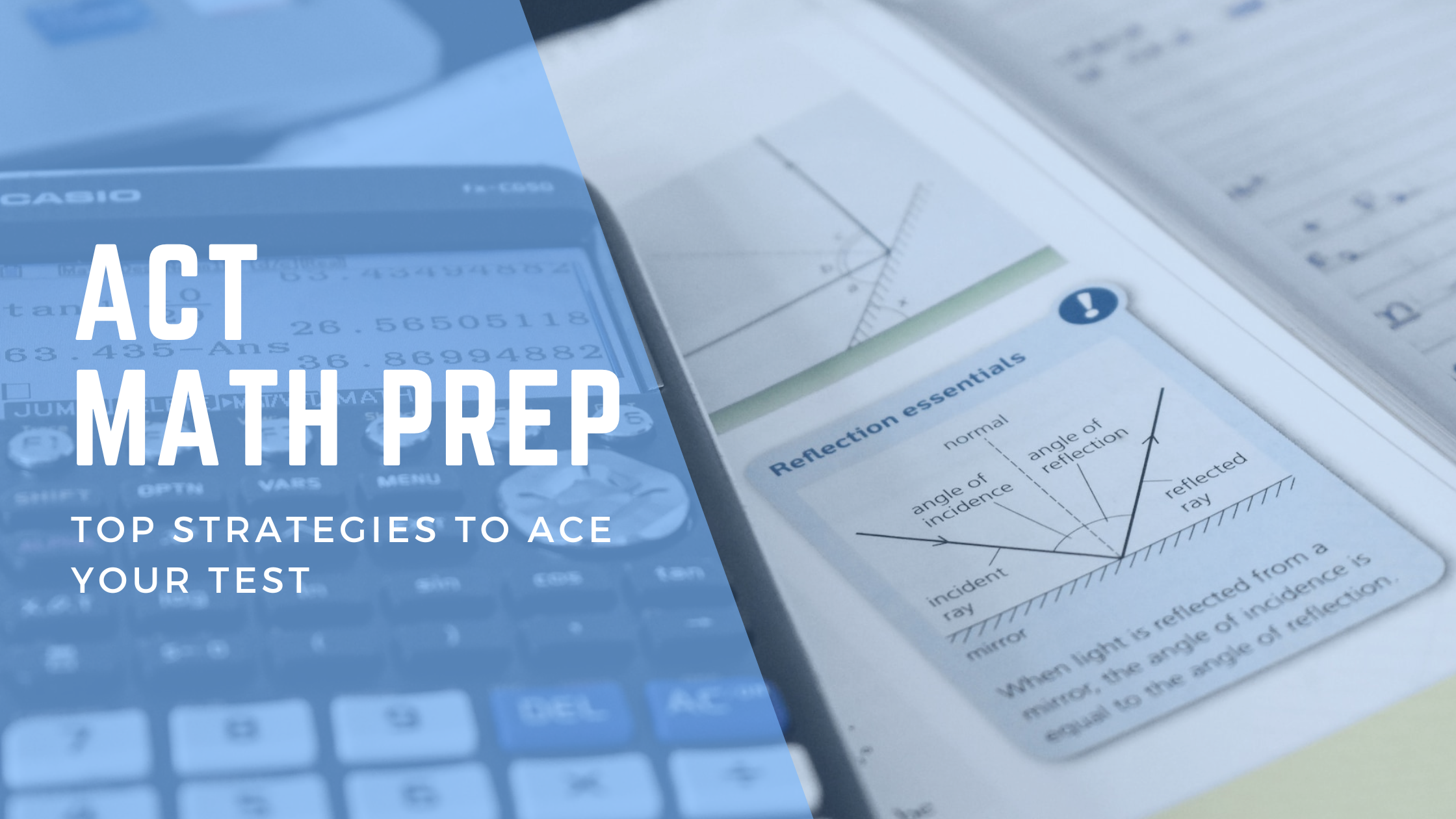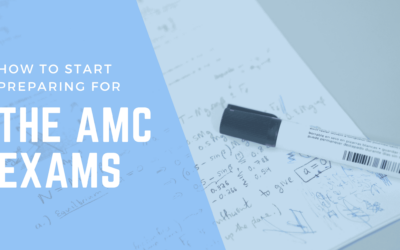For many students, the math section of the ACT is a formidable foe. It demands swift and precise solutions in algebra, geometry, trigonometry, and statistics. Nail this section, and you’re not only signaling to colleges your readiness for advanced math courses but also setting the stage for potential STEM careers.
Yet, achieving excellence in the ACT’s math section isn’t a walk in the park. Beyond mastering concepts and formulas, you’ve got to tackle time management, sidestep easy-to-make errors, and handle the intense pressure that comes with high-stakes testing.
So, how can you turn this daunting task into a triumph?
We’re here to spill the beans. Drawing from strategies that propelled thousands to success, this article uncovers the top tips and techniques to elevate your ACT math scores. Ready to unlock the secrets?
Understanding the math section of the ACT
We’re going to be thorough here, so you know what’s coming.
The Math section is the second, right after English and before a ten-minute break. It consists of 60 multiple-choice questions (you have five options, which makes things harder) that you have to answer in 60 minutes. The questions are arranged in order of difficulty, from easy to hard, and this is something you can take advantage of. We’ll look at that later.
There are 20 questions for each level of difficulty (easy, medium, and hard). By that, we mean questions 1 to 20 are easy and should take seconds to solve, 21 to 40 are medium (if you’re well-prepared, these should be only a cut above easy), and 41 to 60 are hard (get 25% of these right for a score of 27, which is strong; get 75% of these right for a score of 33, which is far more competitive).
Questions in the Math section can be categorized into three types:
- Basic skills
- Application
- Analysis
Basic skills questions assess your knowledge of mathematical facts, formulas, and procedures. Application questions require you to apply your mathematical skills to real-world situations or word problems. Analysis questions challenge your logical reasoning and critical thinking abilities when confronted with complex or abstract problems.
These question types will be from the following topics:
- Pre-algebra (comprising about 20-25% of the 60 questions)
- Elementary Algebra (15-20%)
- Intermediate Algebra (15-20%)
- Coordinate geometry (15-20%)
- Plane geometry (20-25%)
- Trigonometry (5-10%)
Your expected familiarity with the topics is what defines their difficulty. Hence, there is a certain pattern to the order of topics. You can expect the algebra questions toward the beginning of the ACT math test with geometry and trig dominating the end.
The Math section is scored on a scale of 1 to 36, based on the number of correct answers. Importantly, there is no penalty for incorrect answers or questions left unanswered. This means you should aim to answer every question, even if you need to guess as time is running short.
In addition to the overall section score, you will receive reporting category scores in three assessment areas: Preparing for Higher Math, Integrating Essential Skills, and Modeling. These categories further break down into specific topics, such as Number and Quantity, Algebra, Functions, Geometry, and Statistics and Probability, providing you with a detailed analysis of your performance in various mathematical concepts.
To get the scores you need on the ACT, you need some very solid Math skills. Each section on the ACT has a score of 36, and the average of all sections is what gives the overall ACT score. Therefore, each section is equally important, but math presents a challenge to almost everyone. If you get a poor score, the points available to make the cut for your dream school get farther away from you.
Proven test-taking strategies for ACT math
Now we know why the Math section can be tricky to pass. However, with some effective test-taking strategies, you can improve your performance and score higher than you think. We have some tips to help you ace this:
1. Read carefully
Pay close attention to the wording of each question. Sometimes, the ACT may include extra information or use tricky wording to confuse you. Read the question carefully to understand what it’s asking for.
2. Time yourself in practice so you don’t have to pace yourself during the exam
Never rush, and always check your work carefully. Let each problem take as long as it takes.
But, you should nonetheless monitor your pacing during practice. Ideally, you want to be able to answer the first 30 questions accurately and confidently in less than 30 minutes, so that you have more than 30 minutes for the last (harder) 30 questions.
If you can’t yet work at that pace, don’t try to speed up. Instead, identify operations and habits that are taking the most time, and drill those core skills until they require less time and energy. Such deliberate practice will lower your time and increase your score without inviting careless (AKA score-killing) mistakes.
3. Use the process of elimination
For each question, there are five possible answers, but only one is correct. Therefore, you can use the process of elimination to narrow down your choices and increase your chances of getting the right answer.
To do this, look for answer choices that are obviously wrong, irrelevant, or inconsistent with the given information. You can also use logic, estimation, or substitution to eliminate answer choices that do not make sense or do not fit the question. By eliminating one or more answer choices, you reduce the number of options you have to consider and save time.
4. Work backward
If you’re stuck on a problem, try working backward from the answer choices. Plug in each choice and see which one satisfies the given conditions or equations.
5. Use estimation
In some cases, you can use estimation to quickly eliminate answer choices or get a rough idea of the correct answer. Round numbers or use approximate values to simplify calculations.
6. Allocate your time wisely
A good rule of thumb is to aim to spend at most 30 seconds or so on easy questions, no more than 60 seconds or so on regular questions, and something more like 90 seconds on hard questions.
If you encounter a question that is clearly going to take longer than that, you’re probably thinking about it the wrong way. Skip it for now, and come back to it after first answering a different few problems to refresh your perspective.
7. Show your work
While the ACT is a multiple-choice exam, it’s still beneficial to show your work for complex problems. This can help you catch any calculation errors and provide a clear path to the correct answer. If you write more, you’ll be right more.
8. Review your work
After every page or two, go back and review your answers. Check for careless mistakes, misreading, and misinterpretation. Make sure you haven’t skipped any questions or left them blank.
9. Practice makes permanent
If you want to use a strategy on test day, then you must practice it many times, under test conditions, before test day. No matter your solemn promises to yourself, on test day you will not remember to do anything that you haven’t drilled.
Effective time management and prioritization
If you’re a student who has to juggle work and study, you might feel overwhelmed by the amount of tasks you have to complete. You might wonder how you can find enough time to study for your classes and prepare for the ACT, while also fulfilling your school responsibilities and maintaining a healthy lifestyle. Don’t worry, you’re not alone.
Many students face the same challenge and manage to succeed with some effective time management and prioritization skills. You too can achieve your goals and succeed in both areas. Here are some tips to help you manage your time and prioritize your tasks:
1. Set clear and realistic goals
What do you want to achieve in your academic and professional life? How do you measure your progress and success? How much time do you need to devote to each goal? Having a clear vision of what you want to accomplish will help you prioritize your tasks and stay focused on what matters most.
2. Plan ahead and use a calendar
A paper planner, a digital app, or a combination of both, it doesn’t matter. Get a calendar. Having one will help you keep track of your deadlines, appointments, exams, and other important events. You can also use it to block out specific times for studying, working, resting, and other activities. This way, you’ll have a clear overview of your weekly and monthly schedule, and avoid conflicts or overlaps.
3. Break down large tasks into smaller ones
Sometimes, you might feel overwhelmed by the amount of work you have to do, especially with the ACT coming up. To avoid procrastination and stress, try breaking down large tasks into smaller ones. For example, if you have to write a research paper, you can divide it into steps such as choosing a topic, doing research, outlining, writing, editing, and proofreading. Then, assign a deadline and a time slot for each step spread out over a few days. This way, you’ll make your work more manageable and achievable.
4. Prioritize your tasks and use the 80/20 rule
Not all tasks are created equal. Some are more important and urgent than others, and some have more impact on your goals than others. To prioritize your tasks effectively, you can use the 80/20 rule, also known as the Pareto principle.
This rule states that 80% of your results come from 20% of your efforts. In other words, focus on the tasks that have the most value and benefit for your goals, and eliminate or delegate the ones that have less impact or urgency. Don’t skip your chores though.
5. Balance work and study with rest and fun
Finally, don’t forget to balance work and study with rest and fun. Working and studying hard is important, but so is taking care of yourself and enjoying life. Make sure you get enough sleep, eat well, exercise regularly, and spend time with your friends and family.
Also, reward yourself for your achievements and celebrate your successes. This boosts your motivation, productivity, and happiness.
Personalized coaching and tutoring
As a student who wants to achieve your academic goals, you might be wondering if personalized coaching and tutoring are worth your time and money. After all, there are plenty of online resources, books, and courses that can help you ace the ACT, improve your grades, or master a new skill. Why would you need a human tutor or coach to guide you?
The answer is simple: Personalized coaching and tutoring offer many benefits that generic or self-directed learning methods cannot match. Here are some advantages of working with a tutor or coach who understands your needs, goals, and learning style.
1. Identifying and overcoming specific challenges
Whether you struggle with math, reading comprehension, test anxiety, time management, or motivation, a tutor or coach can help you pinpoint the root causes of your difficulties and provide you with tailored strategies to overcome them. A tutor or coach can also monitor your progress and adjust your learning plan accordingly, ensuring that you are always on track and moving forward.
2. Catering to your individual learning style
Everyone learns differently, and what works for one student may not work for another. Some students are visual learners who prefer diagrams, charts, and images. Some are auditory learners who benefit from listening to lectures, podcasts, or audiobooks. Some are kinesthetic learners who learn best by doing, touching, or moving. A tutor or coach can assess your learning style and use the appropriate methods and tools to help you learn more effectively and efficiently.
3. Building confidence and self-esteem
One of the biggest obstacles to learning is a lack of confidence. If you doubt your abilities, feel frustrated by your mistakes, or compare yourself negatively to others, you are likely to lose interest and motivation in your studies.
A tutor or coach can help you build your confidence by providing you with positive feedback, encouragement, and recognition. A tutor or coach can also help you celebrate your achievements, no matter how big or small, and remind you of your potential and value as a learner.
4. Making learning enjoyable and rewarding
Learning can be fun if you have a tutor or coach who is passionate, knowledgeable, and supportive. A tutor can make learning more engaging by using games, quizzes, puzzles, stories, or real-life examples. They can also make learning more rewarding by helping you set realistic and attainable goals, track your improvement, and reward yourself for your efforts.
5. Seeing into your future
Okay, tutors aren’t actually psychic. But especially good ones have seen it all before, probably many times, and so they know how a strategy will (or won’t!) work out for you, once they get to know you and your strengths and challenges. They seem psychic because they know how to make small adjustments to your technique that yield outsized results, all while appearing to read your mind and predict your future. But for us, it’s all just a day’s work.
If you are interested in finding a tutor or coach who can help you reach your full potential, contact Wes Carroll Tutoring & Coaching today. We have shockingly experienced and qualified tutors and coaches who can help you with any subject, skill, or test preparation. Don’t settle for generic or self-directed learning methods that may not suit your needs or goals. Invest in personalized coaching and tutoring today and see the difference it can make in your learning journey.
Overcoming test anxiety and building confidence
Test anxiety is a common problem that affects many students and can interfere with their academic performance. It can cause difficulties concentrating, racing thoughts, sweating, shaking, nausea, and even panic attacks. It can also lower your self-confidence and make you doubt your abilities.
Fortunately, there are some effective ways to overcome test anxiety and build confidence. Here are some tips to help you prepare for and ace your exams:
1. Plan ahead
Don’t leave your studying to the last minute. Create a study schedule and stick to it. Review the material regularly and practice with sample questions or past exams. This will help you familiarize yourself with the format and content of the test and reduce your stress level.
2. Use positive affirmations
Replace negative thoughts with positive ones. For example, instead of thinking “I’m going to fail this test”, think “I have studied hard and I know the material”. Repeat these affirmations to yourself before and during the test. This will help you boost your confidence and calm your nerves.
3. Relax
Before each practice test, do some breathing exercises, meditation, yoga, or any other activity that helps you relax. During the test, take breaks to stretch, drink water, or close your eyes for a few seconds. This will help you release tension and stay focused. By practicing it each time, it will become natural (and therefore powerful!) to you over time.
4. Focus on yourself
Don’t compare yourself to others or worry about what they are doing. Concentrate on your own work and pace yourself. Don’t rush through the questions or skip the ones you don’t know. Read the instructions carefully and check your answers before submitting them.
5. Reward yourself
After the test, treat yourself to something you enjoy, such as a movie, a snack, or a nap. Don’t dwell on your mistakes or worry about your grade. Be proud of yourself for doing your best and celebrate your efforts.
Recommended study resources
Preparing for the ACT Math section requires a lot of practice and review of various math concepts and skills. Fortunately, there are many study resources available online that can help you improve your math knowledge and test-taking strategies. Here are some of the best study materials, practice tests, and online resources for ACT math preparation:
1. Study materials
Study materials are books, guides, or courses that provide comprehensive and in-depth coverage of the math topics and skills tested on the ACT. They also offer tips, tricks, and techniques to help you solve math problems faster and more accurately. Some of the most reputable study materials for ACT math prep are:
The official ACT prep guide
This is the official guide from the makers of the ACT. It contains detailed explanations of the test format, content, and scoring, as well as six full-length practice tests with answer keys and scoring guides. It also provides hundreds of additional practice questions with explanations and strategies for each question type.
Use one of these at the beginning of your preparation in order to gauge your actual starting point, then switch to other tests for your everyday practice.
The Princeton review’s ‘cracking the ACT’
This is a popular guide from a leading test prep company. It covers all the math topics and skills you need to know for the ACT, as well as test-taking strategies and techniques to help you ace the math section. It also includes six full-length practice tests with detailed answer explanations and score reports.
It’s not as good as older official ACTs, but it’s good enough for building skills.
Kaplan’s ACT math prep
This is a comprehensive course from another leading test prep company. It offers over 16 hours of video instruction, interactive quizzes, and personalized feedback from expert instructors. It also includes two full-length practice tests with detailed answer explanations and score reports.
Like Princeton’s book, this one is good enough for skill-building. But when it’s time to put your practice to the test, use the official book for a trustworthy before-and-after comparison.
2. Practice tests
Practice tests are simulated exams that mimic the format, content, and difficulty level of the actual ACT Math section. They help you assess your strengths and weaknesses, familiarize yourself with the test structure and timing, and build your confidence and stamina. Some of the best practice tests for ACT math preparation are:
The official ACT practice tests
These are free practice tests from the official ACT website. They are based on actual past exams and reflect the current standards and expectations of the test. They include answer keys and scoring guides, as well as explanations for each question.
The Mometrix’s ACT math practice test
This is a free online practice test from a trusted test prep provider. It consists of 60 questions that cover all the math topics and skills tested on the ACT. It also provides instant feedback, answer explanations, and score reports.
This resource is only useful in the early stages of your preparation.
3. Online resources
Online resources are websites, apps, or platforms that offer interactive and engaging learning tools and practice opportunities for ACT math preparation. They help you reinforce your math concepts and skills, learn from your mistakes, and track your progress. Some of the best online resources for ACT math preparation are:
Khan Academy
This is a free online platform that provides personalized and adaptive learning paths for ACT math preparation. It offers video lessons, practice exercises, quizzes, tests, and reports that cover all the math topics and skills tested on the ACT. It also syncs with your official ACT account and recommends areas to focus on based on your previous test results.
The PrepScholar’s online ACT prep program
This is a paid online program that offers customized and comprehensive ACT math preparation. It analyzes your strengths and weaknesses, creates a tailored study plan based on your goals and schedule, and provides hundreds of realistic practice questions with detailed answer explanations and strategies. It also tracks your progress and adjusts your plan accordingly.
However, like most such tools, the “strengths and weaknesses” evaluation is most relevant in the middle of the score range—i.e. at the beginning of your preparation. As your skill increases and your strategy becomes more nuanced, you’ll find this tool less and less helpful, and eventually just plain counterproductive.
Using these resources will help you boost your math knowledge and skills, improve your test-taking strategies, and achieve a higher score on this section. Remember to use a variety of resources to maximize your learning potential and outcomes.
Staying informed: Test updates and curriculum changes
The most significant update to the ACT math section took place in September 2015, when the test introduced new scores and reports to provide more insight into your performance and potential. These include the STEM score, the ELA score (the average of your English, Reading, and Writing scores), the Progress Toward Career Readiness indicator, and the Interest-Major Fit score.
Another change that occurred in September 2015 was the reduction of the number of passages in the Science section from seven to six, which may affect your pacing and stamina for the Math section that follows.
The most recent change to the ACT math section was in September 2020, when the test started offering super scoring and online testing options for students who take the test more than once. Superscoring means that ACT will calculate and report your highest possible Composite score based on your best scores from each subject across multiple test dates. With online testing, you can take the test on a computer at an official testing center and receive your scores faster.
Moving on…
We’ve covered a range of strategies and insights to help you approach ACT math prep with confidence and determination. Here’s the short of it:
1. Understand the Math section. Knowing what to expect is the first step to success.
2. Learn effective techniques to boost your speed and accuracy. Make sure you:
3. Augment your learning with recommended study resources; and
4. Invest in personalized coaching and tutoring
And don’t just hire any tutor that happens to cross your path. Look for the best you can afford. After all, this is an investment that will pay off for the rest of your life.
If you’re aiming for a perfect or near-perfect score, we recommend individuals and firms with well-established track records, such as ours at Wes Carroll Tutoring & Coaching.
Personalized, high-quality tutoring and coaching are more difficult and rarer than they seem at first. But it also makes a bigger difference than you may at first realize, in helping you distinguish yourself from other applicants. Done right, it’s worth every penny and every moment.
As you embark on your ACT math preparation journey, remember that determination, strategic planning, and a growth mindset will be your greatest allies. Stay committed to your goals, and with the right strategies and resources, you can achieve success in the Math section and make significant strides toward your academic and career aspirations.




0 Comments